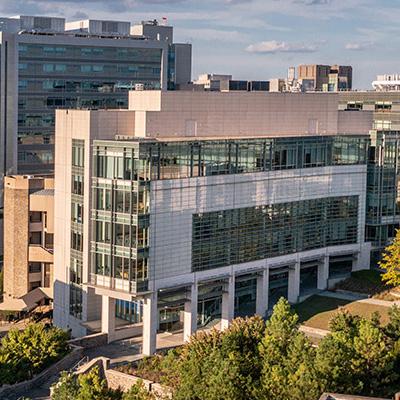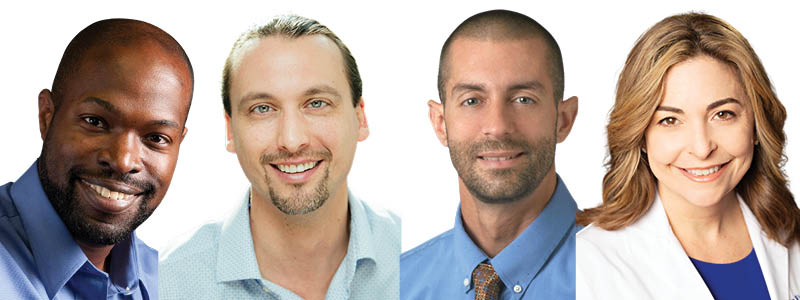
Duke neuroscientists discuss the challenges and technological achievements that help us better understand our complex brain.
Alison Adcock, MD, PhD, the moderator for the very first panel event of Research Week 2022, “Advancing Neuroscience,” opened the discussion with a vivid summation of why this particular subject holds such fascination for researchers.
“The brain is just the most compelling topic for many of us because all of our feelings and ideas and memories come from the operation of this massive jelly walking around inside of our skull,” said Adcock.
Understanding the brain is a mind-boggling scientific enterprise requiring expertise in many different disciplines alongside continuously improving technology to probe the infinitesimally small neurons that make up this most complex of organs.
Four Duke experts on brain science talked about the intersection of engineering, psychiatry, neurobiology, gerontology, and computer science, and the future for neuroscience research and disease treatment.

On Where to Study Within the Brain and How Much (and What) to Measure
Greg Field, PhD
“How many different cell types are there in the mammalian brain or the human brain? And how do we know when we have the right answer? How do we know when we've reached ground truth, if you will? And should we be prioritizing different kinds of information like genetic information or morphological information or physiological information in doing those classifications? Or should we treat all of those pieces of information equally? These are all kind of epistemological problems that the field is grappling with right now.”
“What and how much do we need to measure in the brain? There are certainly certain kinds of questions for which measuring the activity of a single neuron can provide you a tremendous amount of insight. But there are other kinds of questions in which that's just too limiting. And I think the field is really trying to have a theoretical understanding for how much we need to measure about brain activity in order to understand its relationship to behavior and disease states and neural degeneration, so on and so forth.”
Kafui Dzirasa, MD, PhD
“When you have diseases like Alzheimer's disease or Parkinson's disease, it's not just one loss of one cell that leads to behavioral problems. In fact, in the case of Parkinson's disease, you have to lose about 70% of the cells in an area of your brain called the substantia nigra. It's clear that while there's inflammation in cells, one cell isn't enough to get all of the information about what's going on. If you had a brilliant cup of coffee, an americano let's say, you can remove a water molecule and it's still an americano. It's not until you get rid of most of it that suddenly you're dealing with an espresso.”
“We neuroscientists tend to be really obsessed with [the brain] and think it's central to life itself, and at best, the rest of the body is just doing things to support the organ we care so much about… But it is certainly the case that the brain has really fast, bidirectional interactions with the rest of the body… And so the computations that are happening in the brain are happening in a way that's also totally integrated with the body… In order to understand how behavior comes out of this organ, we're also going to need to understand what is going on in the entire body and how these systems fit together.”
On Technological Advances to Guide Future Treatments of Brain Disease
Cameron McIntyre, PhD
“One concept that has really grown over the last five or 10 years in neurosurgery and novel application of neurosurgical devices is using electrical stimulation through implanted electrodes to interact with very complex brain circuits. We can map those circuits using various imaging modalities, diffusion weighted imaging, structural imaging, functional MRI imaging. If you start to put all that information together, you can give neurosurgeons the tools that actually allow them to plan and interact with the science while performing traditional clinical medicine, and so we got really into this whole concept of holographic surgical planning, especially for these neuromodulation clinical trials.”
Field
“Major technology that's been developed now is the ability to image the activity of neurons. These ganglion cells, you can see them light up as we present different visual stimuli to the retina. So as the particular cell gets brighter, or dimmer, it's indicating to us that the cell’s becoming more or less active to particular kinds of visual stimuli.”
“Artificial intelligence is a set of technologies that's really exploding right now. And it's quickly being integrated into many areas of biomedical sciences. But in particular, it's been very quickly integrated into neuroscience to try to understand or extract meaning from the activity of large numbers of neurons, or from fMRI signals from many locations in the brain. Or even just videos of animals behaving and using artificial intelligence to segment those videos in smart, robust, and principled ways.”
Dzirasa
“I work on recording electrical activity from many sides of the brain at the same time. Ultimately, you're recording a lot of electrical activity... And so with our own eyes, we can't pick up those patterns. We have to leverage an entirely different discipline — in this case, computer engineering or statistics — to ultimately use tools like machine learning, for computers to learn the patterns in those signals… And once we're able to do that, we can ask questions about what the right ways are to change those patterns in a way that can be therapeutic in the context of disease.”
Heather Whitson, MD
“Alzheimer's disease is the most common cause of dementia in this country. Duke and UNC collaboratively are one of the most recently designated NIH Alzheimer's Disease Research Centers. Our theme is understanding age-related factors across the lifespan that contribute to Alzheimer's disease and other dementias.”
“It's been known for a long time that that genetic risk is important [in Alzheimer’s disease]. But people are born with that risk. And then most of them will live six, seven, eight decades before they manifest the symptoms of Alzheimer's disease, and before they even have the telltale changes in the brain of amyloid and tau. Increasingly, what we realize is that, even before the amyloid develops, there are detectable changes in the brain of people who will go on to develop the disease, Alzheimer's disease, and there are changes in the body that seemed to reflect this as well.”
“We also do an incredible amount of outreach and engagement across eastern North Carolina because one of our goals is to change what the traditional population that has contributed to Alzheimer's disease research is. We're looking for people who are younger and more diverse than what has been previously included.”
“We are also collecting novel data. In addition to the usual stuff like spinal fluid, cognitive testing, we are collecting retinal images, digital biomarkers, high-resolution advanced MRI techniques, and sensory and mobility measures to try to understand how the aging brain, when it is losing other abilities in the body such as vision, hearing, and balance and strength, mobility, how that affects the aging brain. Our goal is to sort of be the new friendly neighborhood concierge for Alzheimer's disease research.”
On the Importance of Philanthropy for Brain Science Research
Field
“Things like the Duke Institute for Brain Sciences’ incubator award has allowed my lab, and lots of other labs here at Duke, to do projects and to get projects off the ground that wouldn't be possible with traditional NIH mechanisms. And same with the Holland-Trice awards from the Holland-Trice family. Those have also been immensely important to my lab, and I know a lot of other labs getting new and innovative projects off the ground and escaping some of the traditional incentive structures that limit what you can do.”
Dzirasa
“It's critical for risk taking. One might say, ‘Look, we have huge federal agencies that fund an incredible amount of science.’ But sometimes, they move in conservative ways. That means sometimes it takes much longer to get ideas across. And for anybody who's had a family member who suffered from these illnesses, you realize there's a huge difference in waiting five years to get a treatment out the other end of discovery. Philanthropy allows scientists to take risks that allow things to just go much faster, and that's critically important.”
Whitson
“In my world of clinical research, there is a cost to getting folks in, so it is really important to me to get in people from rural North Carolina that have different risk factors, different exposures over their lifespan, to things that may be contributing to their brain health, that we could all learn a lot from. If I can't offer them car services, and dependent care coverage to be able to get them to come in, then no wonder they don't participate in research.”
Meet the Experts
R. Alison Adcock, MD, PhD (moderator) is the director of the Duke Institute for Brain Sciences and the Center for Cognitive Neuroscience, and associate professor of Psychiatry & Behavioral Sciences, Neurobiology, and Psychology & Neuroscience at Duke.
Kafui Dzirasa, MD, PhD is a Howard Hughes Medical Investigator and the K. Ranga Rama Krishnan Associate Professor of Psychiatry & Behavioral Sciences at Duke, with additional appointments in Neurobiology, Bioengineering, and Neurosurgery, as well as a member of the Duke Institute for Brain Sciences.
Greg Field, PhD is an associate professor of Neurobiology at Duke and member of the Duke Institute for Brain Sciences.
Cameron McIntyre, PhD is a professor of Neurosurgery in the Duke University School of Medicine and a professor of Biomedical Engineering in the Pratt School of Engineering at Duke.
Heather Whitson, MD is the Director of the Duke Center for the Study of Aging and Human Development, co-director of the Duke-UNC Alzheimer’s Disease Research Center, and professor of Medicine, Ophthalmology, and Head & Neck Surgery and Communication Sciences at Duke.
Dan Vahaba is Communication Director for the Duke Institute for Brain Sciences